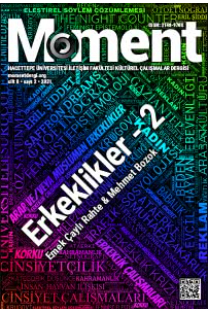Transit: Tanıklık ve Bellek Meselesi Olarak Mültecilik
Bu çalışma Christian Petzold’un Transit (2018) filmini, mülteci figürü çerçevesinde ve göç, kimlik, yersizlik-yurtsuzluk gibi temalar etrafında çözümlemeyi amaçlamaktadır. Anna Seghers’in Transit romanından uyarlanan film, II. Dünya Savaşı sırasında Avrupa’da sıkışıp kalmış bir grup mülteciye odaklanan romandan farklı olarak, günümüzdeki mülteci kriziyle bağ kurmaya olanak sağlamaktadır. Dolayısıyla film Avrupa’nın geçmişiyle ilişki kurma ve yüzleşme girişimi olduğu kadar günümüz Avrupa’sıyla da yakından ilişkilidir. Çalışma Zygmunt Bauman, Hannah Arendt, Giorgio Agamben gibi düşünürlerden ve Lacancı psikanalizden hareketle, filmin kolektif belleğe seslenerek geçmişten günümüze mülteci olma durumunu hangi kavram ve tartışmalarla ilişkilendirdiğini araştırmaktadır. Çalışmanın sonucunda, mültecilerin anlatıda toplumsal düzenin hayali bütünlüğünü tehdit eden, sınırların dışına atılması gereken ötekiler/yabancılar olarak tanımlandığı, bürokratik kurumların ise toplumsal simgesel düzende Yasa’nın uygulayıcıları işlevini üstlendikleri görülmektedir. Bu noktada film yaşamla ölüm arasındaki sınır çizgisinde, geçicilik ve belirsizlik temelinde hayatlarını sürdüren mültecilerin görünmez olma, kimliği yitime endişesini ve yersiz-yurtsuzluğa bağlı huzursuzluğunu açığa çıkarmaktadır. Filmin estetik tercihleri ise mültecilerin bir kurban anlatısı içinde sunulmasının önüne geçmektedir.
Transit: Refugee as a Witness and Memory
This study aims to analyze Christian Petzold’s film Transit (2018) in the context of themes such as immigration, identity, homelessness, and refugee figure. Adapted from Anna Seghers’ novel Transit, the film differs from the novel, which focuses on a group of refugees trapped in Europe during World War II, and allows us to connect with the current refugee crisis. Therefore, the film is closely related to today’s Europe as much as it is an attempt to relate to and confront Europe's past. Based on thinkers such as Zygmunt Bauman, Hannah Arendt, Giorgio Agamben, and Lacanian psychoanalysis, the study explores which concepts and discussions the film relates to the situation of being a refugee from past to present by appealing to the collective memory. As a result of the study, it is seen that refugees are defined in the narrative as others/foreigners who threaten the imaginary integrity of the social order and need to be thrown out of the borders, while bureaucratic institutions assume the function of executors of the Law in the social symbolic order. At this point, the film reveals the anxiety of being invisible, the loss of identity, and the unrest due to the homelessness of refugees, who live on the borderline between life and death, on the basis of transience and uncertainty. The aesthetic preferences of the film, on the other hand, prevent refugees from being presented in a victim narrative.
___
- Abel, M. (2013). Counter cinema of Berlin School. Rochester & New York: Camden House.
- Abel, M. (tarihsiz). German desire in the age of venture capitalism. Erişim: 09 Ağustos 2022, http://cinemaguild.com/homevideo/ess_yella.htm
- Agamben, G. (2004). Auschwitz’den artakalanlar: Tanık ve arşiv. (A. İ. Başgül, Çev.). Ankara: Bağımsız Kitaplar.
- Agamben, G. (2008). Beyond human rights. Open, 15, 90-95.
- Agamben, G. (2012). Gelmekte olan ortaklık. (B. Parlak, Çev.). İstanbul: MonoKL
- Arendt, H. (2014). Totalitarizmin kaynakları 2: Emperyalizm. (B. S. Şener, Çev.). İstanbul: İletişim.
- Balas, A. (2021). Film theory after copjec. Canadian Review of American Studies, 51 (1), 63-82.
- Bardan, A. (2020). Europe, spectrality and “post-mortem cinema”: The haunting of history in Christian Petzold’s Transit (2018) and Aki Kaurismäki’s Le Havre (2011), Northern Lights, 18, 115–29, https://doi.org/10.1386/nl_00017_1
- Bauman, Z. (2003). Modernlik ve müphemlik (İ. Türkmen, Çev.). İstanbul: Ayrıntı.
- Bauman, Z. (2018). Iskarta hayatlar: Modernite ve safraları (O. Yener, Çev.). İstanbul: Can.
- BBC (2015). Polonya'da AB karşıtı Hukuk ve Adalet Partisi'nin seçim zaferi. Erişim: 16 Eylül 2022, https://www.bbc.com/turkce/haberler/2015/10/151026_polonya_secim.
- Benjamin, W. (2001). Son bakışta aşk (N. Gürbilek ve S. Yücesoy, Çev.). İstanbul: İmge.
- Böcking, C. (2022). Negotiating borders in Anna Seghers’ and Christian Petzold’s Transit. Interfaces, 47, 1-16, https://doi.org/10.4000/interfaces.5400
- Butler, J. (2015). Savaş tertipleri (Ş. Öztürk, Çev.). İstanbul: Yapı Kredi.
- Chambers, I. (2014). Göç, kültür, kimlik. (İ. Türkmen ve M. Beşikçi, Çev.). İstanbul: Ayrıntı.
- Dolar, M. (2020). Kimdi mağdur/kurban. J. Krečič (Der.), içinde, Son gerisayım (s. 75-87) (B. E. Aksoy, Çev.). İstanbul: Metis.
- Fisher, J. (2013). Christian Petzold. Urbana, Chicago & Springfield: University of Illinois Press.
- Greussing, E. & Boomgaarden, H. G. (2017). Shifting the efugee arrative? An automated frame analysis of Europe’s 2015 refugee crisis, Journal of Ethnic and Migration Studies, 43 (11), 1749-1774, doi: 10.1080/1369183X.2017.1282813.
- Hagener, M. (2018). Migration and refugees in German cinema: Transnational entanglements. Studies in European Cinema, 15 (2-3), 110-124, doi: 10.1080/17411548.2018.1453772
- Homer, S. (2013). Jacques Lacan. (Çev: A. Aydın). Ankara: Phoenix.
- Hosek, J. R. (2021). Towards a European postmigrant aesthetics: Christian Petzold’s Transit (2018), Phoenix (2014), and Jerichow (2008). Transit, 13 (1), 52-70.
- Kearney, R. (2012). Yabancılar tanrılar canavarlar. (B. Özkul, Çev.). İstanbul: İmge.
- Khader, J. (2020). Mülteci biyopolitikasının ötesinde: Bütünlük, küresel kapitalizm ve ortak mücadele. J. Krečič (Der.), içinde, Son gerisayım (s. 161-189) (B. E. Aksoy, Çev.). İstanbul: Metis.
- McGowan, T. (2012). Gerçek bakış: Lacan sonrası sinema kuramı (Z. Ö. Barkot, Çev.). İstanbul: Say.
- Murti, V. (2019). Christian Petzold on Transit, Kafka, his love for Den of Thieves and more. Erişim: 22 Ağustos 2022, https://www.rogerebert.com/interviews/christian-petzold-on-transit-kafka-his-love-for-den-of-thieves-and-more.
- Plate, L. & Smelik, A. (2013). Performing memory in art and popular culture: An introduction. L. Plate & A. Smelik (Der.), içinde, Performing memory in art and popular culture (s. 1-22). New York: Routledge.
- Volk, C. (2010). The decline of the order: Hannah Arendt and the paradoxes of the nation-state. S. Benhabib (Der.), içinde, Politics in dark times: Encounters with Hannah Arendt (s. 172-197). New York: Cambridge University Press.
- Yeğenoğlu, M. (2016). Avrupa’da İslam, göçmenlik ve konukseverlik (P. B. Yalım, Çev.). İstanbul: Bilgi Üniversitesi.
- Zupančič, A. (2020). Avrupa’nın geleceğine dönüş. J. Krečič (Der.), içinde, Son gerisayım (s. 21-34) (B. E. Aksoy, Çev.). İstanbul: Metis.
- ISSN: 2148-970X
- Yayın Aralığı: 2
- Başlangıç: 2014
- Yayıncı: Hacettepe Üniversitesi İletişim Fakültesi
Sayıdaki Diğer Makaleler
İstanbul’da Kent Tarımının Çelişkili Yörüngesi
Türkiye'deki Mağrip Diasporasının Yemek ve Yemek Yolları: Kimlik, Aidiyet ve Bütünleşme
Instagram'da Yemeğin Gösterisi: #foodporn
72 Milletin Çorbada Tuzu Var: Sakarya Mutfak Kültürü Üzerine
Marie-Hélène Sauner-Leroy ile Söyleşi
